RELICS OF SAINT JEAN NEPOMUCENE AND SAINT DELPHIN
RELICS OF SAINT JEAN NEPOMUCENE AND SAINT DELPHIN
Our prices are in euros, the prices converted in dollars or other currencies can vary according to the rate.
Free Worldwide Shipping – Secure and Protected Delivery
ref: #RK00-728This oval gilded bronze reliquary, of great ornamental delicacy, is surrounded by a gilt frame adorned with cut red stones—likely glass or garnets—resembling precious gems.
The background is covered with red silk fabric, on which two relics are arranged, each framed within a small gilded diamond shape, symbolizing a miniature chest containing sacred fragments.
Two handwritten inscriptions, on strips of paper or parchment, identify the saints to whom the relics belong:
-
Top: "Sti. Ioan. Nepom. M.", abbreviation of Sancti Ioannis Nepomuceni Martyris, meaning Saint John of Nepomuk, Martyr.
-
Bottom: "Sti. Delphini Ep.", abbreviation of Sancti Delphini Episcopi, meaning Saint Delphin, Bishop.
Good condition with its original glass.
Unopened.
Ecclesiastical seals and silk threads present.
PERIOD: 19th century
DIMENSIONS: 4.5 cm x 3.5 cm
SIZE: 1.8" x 1.4"
Saint John of Nepomuk (c. 1345–1393) was a Czech priest and martyr, vicar general to the Archbishop of Prague. He is best known for refusing to disclose the queen's confessions, which led to his torture and eventual drowning on the orders of King Wenceslaus IV. He became a symbol of the seal of confession and freedom of conscience in the face of political power. Canonized in 1729, he is often depicted with a finger over his lips and five stars around his head. He is the patron saint of confessors and bridges.
Saint Delphin was Bishop of Bordeaux at the end of the 4th century, around 380. A close friend of Saint Paulinus of Nola, he played an important role in spreading Christianity in Aquitaine and in combating Arianism. He is also known for ordaining Saint Paulinus as a priest. A zealous pastor, he left a lasting mark on his diocese through his piety and charity toward the poor. He died around 404 and is venerated as one of the early great bishops of Bordeaux.









